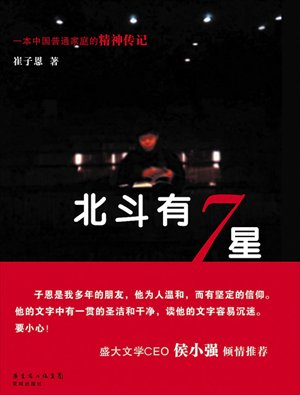Cui Zi'en's new book

Beijing-based gay writer and filmmaker Cui Zi'en released his novel Bei Dou You 7 Xing (Northern Dipper Has 7 Stars) earlier this month, a story chronicling his family's life.
The book tells the stories of seven members of his family beginning with China's pre-liberation (before 1949) days. According to Cui Zi'en, the novel is based on how his Christian family suffered during hard times, and how they supported each other with love, and how their beliefs helped them to overcome the distance between life and death. "Cui is a gentleman with firm beliefs, and his book is clean and innocent," said Hou Xiaoqiang, CEO of Cloudary Net Literature.
According to Cui, the seven stars of the Northern Dipper symbolize the seven members of his family as well as the destiny of most Chinese families. "I found that none of my family members had a relationship with the privileged," said Cui. "It filled our material life with hardship but kept our spiritual life innocent. I'm not saying how clean my family is, as it's very common among my kith and kin, and I believe most Chinese families were living under such circumstances at that time."
Cui also recently unveiled plans about his next book. "It is another book about memories titled Friends. The book is a record of real stories without any exaggerations," said Cui.
Cui Zi'en was born in Harbin, Heilongjiang Province in 1958 and graduated from the Chinese Academy of Social Sciences (CASS) and is currently an associate professor at the Film Research Institute at the Beijing Film Academy. Cui has been working as a writer, actor, director, media figure and teacher, and his work usually focuses on issues dealing with same-sex love.
Cui first publicly acknowledged he was gay while working as a lecturer at the Beijing Film Academy in 1991, and was regarded as the first Chinese mainlander to openly admit his homosexual orientation. However, the writer paid a huge price for his courageous action, as the school forced him to leave his teaching possession and give up his on-campus housing. Cui was banned from teaching for ten years and it was not until 2001 that he was allowed to return.
Cui has been bringing same-sex love issues to the public's attention in a creative way since his return in 2001. He has given classroom lectures on "Gay Cinema" and "Underground Cinema in China," and has also managed to establish academic links with the LGBT movement and feminism.
As an avant-garde DV filmmaker within the Chinese underground film world, Cui has made nineteen films dealing with same-sex love issues. In 1999, he wrote and performed in Men and Women, a film about homosexuality in China. It won the International Federation of Film Critics award at the 52nd Locarno International Film Festival.
In 1997 Cui released Peach Lip, which is regarded as the first novel dealing with gay issues in mainland China. In 2001, his novel Uncle's Earth won the Voice of Germany Literature Prize (Deutsche Welle Literaturpreis 2001), and it was the first time for a gay Chinese novel to win an international prize.